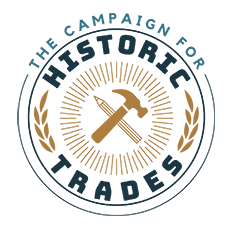Grow Your Career
Find ways to take the next step in your historic trades career.What makes a journey-level worker? For historic trades, it typically means at least 2 years of on-the-job experience with trades-specific competencies. Our historic trades apprenticeships provide the framework to measure and assess these competencies. Registered apprentices earn a journey worker certification, but there are ways to demonstrate this level if you are not enrolled in an apprenticeship.
Guidance
For those that need or want a sherpa. Professionals in the field can help you navigate, provide advice, and network to propel your career forward.
Certification
Find ways to get nationally recognized credentials or get credentialed for your earned experience. This is an important step to gain universal recognition for your knowledge and experience, and is sometimes necessary to obtain certain jobs.
Skill Building
Continuing education, specialized training, and side-skilling are important steps towards mastery. Depending on your goals, there are ample opportunities to develop certain skills in your progression.
Employment
For those looking for specific jobs, employers, or something different—we can help match you with a new employer or figure out how to find your way into an organization or field.
How to Get Started
Find out how you can engage in these activities:
Mentorship
Find out more about mentorships
The Campaign hosts an official mentorship program that matches you with a mastery-level professional based on your interests, priorities, and goals. We also offer information on other mentorship programs, as well as a guide on how to engage in an unofficial mentorship relationship with someone you already know.
Trades Organizations
Explore trades networks
The historic building trades encompass many different trades. If you want to specialize, joining these specialty groups can help you network with like-minded professionals, gain certifications, introduce you to specific skill building opportunities, and find job opportunities.
![]()
![]()
![]()
![]()
Conferences
Find conferences near you
Conferences offer participants valuable networking, learning, and credentialing opportunities. We keep a comprehensive list of trades-related conferences that you can explore and attend.
![]()
![]()
![]()
Workshops
Find workshop opportunities on the calendar
Workshops are shorter duration training and education opportunities that can augment your knowledge, as well as add certifications to your professional repertoire. These can be focus on a higher level skill building or provide an important supporting skill, such as Lead RRP Training.
![]()
![]()
![]()
![]()
Education
Read up on Training and Education providers
Several colleges provide preservation certificates and degrees, with a variety of focuses. Depending on where you are and how you entered the historic trades, different programs might be right for you.
![]()
![]()
Employment
Use PreserveList to find employers
Find employers based on your location and specialty. The Campaign hosts PreserveList, but registering as an apprentice is the best way to get assistance in matching with a qualified employer.
![]()
![]()
![]()
National Park Service
Find out more about the National Park Service programs
We have specific resources related to preservation and trades programs with the National Park Service, both for external audiences and internal employees.
![]()
![]()
![]()
![]()
Apprenticeships
Read more about apprenticeships
The Campaign for Historic Trades is developing specialized apprenticeship tracks in the historic trades. Explore what we offer and what other related apprenticeships are currently available through other trades networks. You can apply towards earned credit and competency to get advanced placement in these apprenticeships.
![]()
![]()
![]()
![]()
There are many ways for individuals, businesses, organizations, and philanthropic groups to support The Campaign. Find out how.
